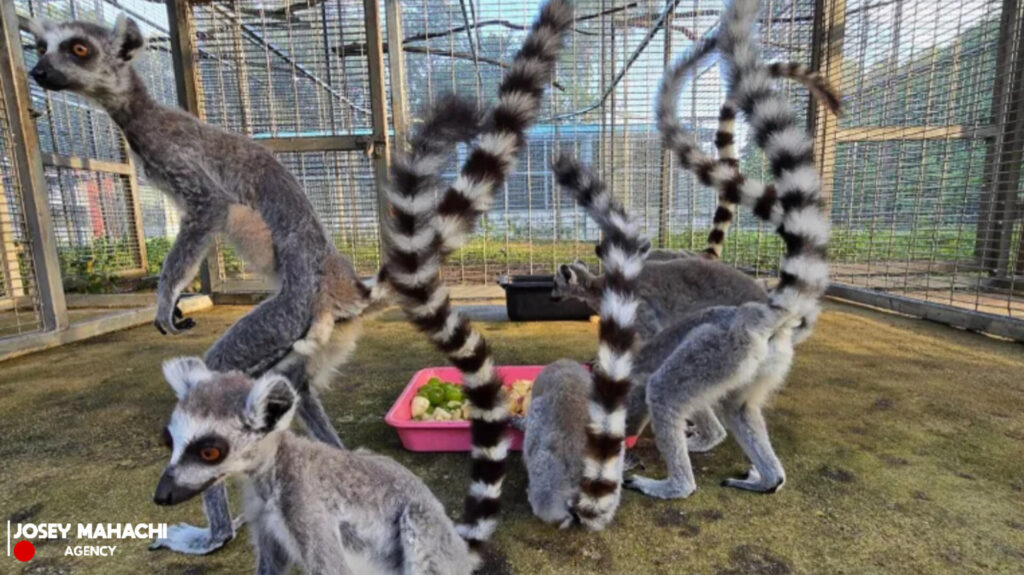By : Lloyd Mahachi
In a historic operation, almost 1,000 trafficked lemurs and tortoises have been successfully returned to Madagascar from Thailand. This massive repatriation effort is the largest of its kind for both countries and marks a significant milestone in the fight against wildlife trafficking. The animals, ranging from vulnerable to critically endangered, were rescued in May after Thai authorities seized a cargo of 1,109 endangered lemurs and tortoises originating from Madagascar.
The seizure was the result of an ongoing international investigation aimed at dismantling transnational criminal networks involved in wildlife trafficking. The operation involved the Royal Thai Police, the United States Fish and Wildlife Service, the Wildlife Justice Commission, the United Nations Office on Drugs and Crime (UNODC), and Interpol. The authorities tracked the convoluted route of the illegal wildlife shipment as it moved from Madagascar through Indonesia and Malaysia before entering Thailand. Thai police moved in as the smugglers passed through Chumphon province, successfully intercepting the shipment.
Had the animals not been rescued, they would almost certainly have been sold into the multibillion-dollar global exotic pet market. The demand for exotic pets is driving the illegal wildlife trade, with criminal networks capable of supplying any type of exotic animal to meet the demand. Giovanni Broussard, Africa coordinator of the environment team at UNODC, noted that there are buyers in every corner of the planet, and the modus operandi of the traffickers change continuously.
Thailand has long been a hub for the wildlife trade, both legal and illegal. While the legal trade operates within the framework of law, the illegal trade violates national or international laws, such as the Convention on International Trade in Endangered Species of Wild Fauna and Flora (CITES). A report in 2023 identified Thailand as Southeast Asia’s top importer of legally traded wildlife from Madagascar. Between 2001 and 2021, Thailand also recorded the highest number of illegal wildlife seizures from Madagascar, second only to Madagascar itself.
The repatriation of the animals was a complex and challenging process. The government of Madagascar expressed its intention to repatriate the animals in June, but Thailand was unable to provide funding. Fortunately, Qatar Airways and the Southern African airline Airlink offered to sponsor the flights, which would transport the animals from Bangkok to Madagascar’s Antananarivo via Johannesburg. The process was not without its setbacks, with 131 tortoises dead and the remaining animals in poor health when they were first examined. Over the following weeks, a lemur and 17 more tortoises died.
Despite these challenges, the surviving animals were cared for at a wildlife breeding centre in Chonburi, run by Thailand’s Department of National Parks. The complex administrative requirements for transporting wild animals internationally caused the flights to be delayed twice. However, all flights were completed successfully on November 30, December 3, and December 12. Environment Minister Max Andonirina Fontaine noted that it was a natural decision to repatriate the animals, as they are fragile and cannot be left in an environment that is not their own.
The successful repatriation of the animals is a significant achievement in the fight against wildlife trafficking. It highlights the importance of international cooperation and the need for continued efforts to combat the illegal wildlife trade. The operation also underscores the importance of protecting Madagascar’s unique biodiversity, with 90 percent of its species found nowhere else on Earth. As Fontaine noted, the international wildlife trade is a huge threat to the country, and it is essential to take action to protect its precious wildlife.
The repatriation of the animals is also a testament to the dedication and hard work of the wildlife officers, veterinarians, and conservationists involved in the operation. Their efforts have given the animals a second chance at life, and it is hoped that they will thrive in their natural habitat. The successful repatriation of the animals serves as a model for future operations and highlights the importance of collaboration and cooperation in the fight against wildlife trafficking.
In conclusion, the largest-ever wildlife repatriation operation is a significant milestone in the fight against wildlife trafficking. It highlights the importance of international cooperation, the need for continued efforts to combat the illegal wildlife trade, and the importance of protecting Madagascar’s unique biodiversity. The operation serves as a model for future repatriations and underscores the importance of collaboration and cooperation in the fight against wildlife trafficking.
Editor : Josephine Mahachi

